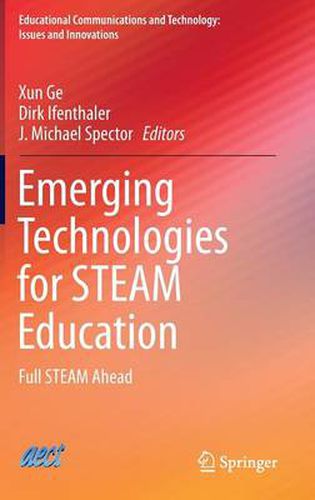Readings Newsletter
Become a Readings Member to make your shopping experience even easier.
Sign in or sign up for free!
You’re not far away from qualifying for FREE standard shipping within Australia
You’ve qualified for FREE standard shipping within Australia
The cart is loading…






This title is printed to order. This book may have been self-published. If so, we cannot guarantee the quality of the content. In the main most books will have gone through the editing process however some may not. We therefore suggest that you be aware of this before ordering this book. If in doubt check either the author or publisher’s details as we are unable to accept any returns unless they are faulty. Please contact us if you have any questions.
This theory-to-practice guide offers leading-edge ideas for wide-scale curriculum reform in sciences, technology, engineering, the arts, and mathematics–the STEAM subjects. Chapters emphasize the critical importance of current and emerging digital technologies in bringing STEM education up to speed and implementing changes to curricula at the classroom level. Of particular interest are the diverse ways of integrating the liberal arts into STEM course content in mutually reshaping humanities education and scientific education. This framework and its many instructive examples are geared to ensure that both educators and students can become innovative thinkers and effective problem-solvers in a knowledge-based society.
Included in the coverage:
Reconceptualizing a college science learning experience in the new digital era. Using mobile devices to support formal, informal, and semi-formal learning. Change of attitudes, self-concept, and team dynamics in engineering education. The language arts as foundational for science, technology, engineering, art, and mathematics. Can K-12 math teachers train students to make valid logical reasoning? Moving forward with STEAM education research.
Emerging Technologies for STEAM Education equips educators, education researchers, administrators, and education policymakers with curricular and pedagogical strategies for making STEAM education the bedrock of accessible, relevant learning in keeping with today’s digital advances.
$9.00 standard shipping within Australia
FREE standard shipping within Australia for orders over $100.00
Express & International shipping calculated at checkout
This title is printed to order. This book may have been self-published. If so, we cannot guarantee the quality of the content. In the main most books will have gone through the editing process however some may not. We therefore suggest that you be aware of this before ordering this book. If in doubt check either the author or publisher’s details as we are unable to accept any returns unless they are faulty. Please contact us if you have any questions.
This theory-to-practice guide offers leading-edge ideas for wide-scale curriculum reform in sciences, technology, engineering, the arts, and mathematics–the STEAM subjects. Chapters emphasize the critical importance of current and emerging digital technologies in bringing STEM education up to speed and implementing changes to curricula at the classroom level. Of particular interest are the diverse ways of integrating the liberal arts into STEM course content in mutually reshaping humanities education and scientific education. This framework and its many instructive examples are geared to ensure that both educators and students can become innovative thinkers and effective problem-solvers in a knowledge-based society.
Included in the coverage:
Reconceptualizing a college science learning experience in the new digital era. Using mobile devices to support formal, informal, and semi-formal learning. Change of attitudes, self-concept, and team dynamics in engineering education. The language arts as foundational for science, technology, engineering, art, and mathematics. Can K-12 math teachers train students to make valid logical reasoning? Moving forward with STEAM education research.
Emerging Technologies for STEAM Education equips educators, education researchers, administrators, and education policymakers with curricular and pedagogical strategies for making STEAM education the bedrock of accessible, relevant learning in keeping with today’s digital advances.